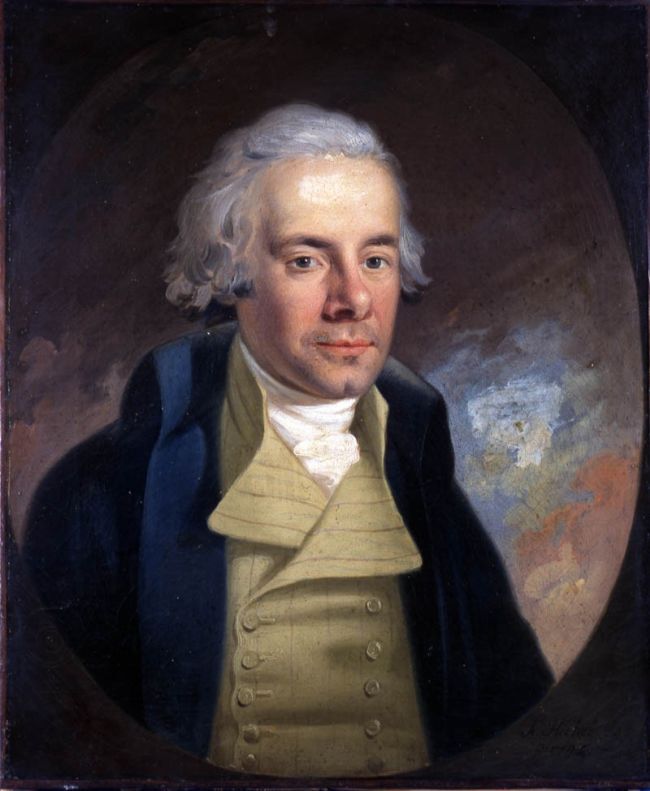 |
| William Wilberforce Artist: Karl Anton Hickel, 1794 Source: Wikipedia |
His abolitionist work came to the fore following his conversion in the fall of 1784 -- a few years after his meeting with Rev. James Ramsay, a former ship's doctor who, appalled by conditions he witnessed in this work, became a clergyman and advocate not only for abolition but also for a variety of moral reforms involving the "lifestyles of the rich and famous" and the treatment of those in the working classes.
In 1787 the first meeting of the Society for Effecting the Abolition of the Slave Trade was held. Wilberforce joined their number in 1791 -- but even before that, he was active in parliament on behalf of abolitionists, and was supported by others in government, including William Pitt and William Grenville (a future Prime Minister). He introduced resolutions on the matter into Parliament, a committee was struck, and the matter extensively investigated. In 1791, Wilberforce introduced a formal bill to abolish the slave trade altogether, but it was roundly defeated. In the wake of this, he continued his work, faced with opposition from pro-slavery advocates who believed that Africans "...were lesser human beings who benefitted from their bondage." (!)
In 1792, Wilberforce again introduced a bill for abolition. What eventually passed was a compromise bill that proposed a gradual abolition. This weak legislation left the meaning of this open to all manner of interpretation, resulting in nothing happening at all.
The next year, another bill for abolition was put forward; this time it was defeated very narrowly. However, England was now at war with France, and the entire subject was put on the back burner. Despite this, Wilberforce continued to introduce bills, trying hard to keep the issue alive -- even though the Society had ceased its meetings and another of its great supporters, Thomas Clarkson, had had to step back due to ill health.
Matters improved in the early part of the nineteenth century. Clarkson recovered and resumed his work on the issue, and the Society for Effecting Abolition resumed its meetings. There were more abolitionists elected to Parliament, and Mr. Grenville was now Prime Minister. By 1807, success was achieved, as both the House of Lords and the House of Commons passed an abolition bill introduced by Mr. Grenville himself. NOTE: The British 'Slave Trade Act' of 1807 did not abolish slavery -- it only abolished the trading of humans as slaves, and the transport of slaves from Africa (and presumably, elsewhere) by the British. However, the Act became a key component in influencing the cessation of the slave trade by other countries (such as the U.S.) Slavery as a whole remained legal in the British Empire until 1833, when the Slavery Abolition Act was passed.
All this might seem a distant memory now...despite our remembering William Wilberforce and his colleagues and their faithful, long-term hard work to rid their corner of the world from a grave injustice and blot on the face of humanity. Wilberforce was an Evangelical Christian, and quite conservative when it came to the role of women in the Abolitionist Movement and elsewhere -- but he was and is remembered as a humanitarian "...who promoted concepts of social responsibility and action".
These concepts continue to remain at the forefront of Western culture and societal behaviour today, as we confront behaviours and attitudes towards "the other", as we strive for diversity with true compassion and love as we have been commanded by God in Christ. This includes not only how we treat those of different races and religions, but also how we respond to the demands placed on us by the COVID-19 virus -- an entity that is no respector of persons, no matter their race, religion, language, birthplace or economic background.
And so, perhaps, to commemorate the life and work of William Wilberforce and his colleagues, let us carry this prayer with us as we go about our own life and work today:
God our deliverer,
who sent your Son Jesus Christ
to set your people free from the slavery of sin:
grant that, as your servant William Wilberforce
toiled against the sin of slavery,
so we may bring compassion to all
and work for the freedom of all the children of God;
through Jesus Christ your Son our Lord,
who is alive and reigns with you,
in the unity of the Holy Spirit,
one God, now and for ever.
AMEN.
-- Source: Common Worship, the Church of England
No comments:
Post a Comment